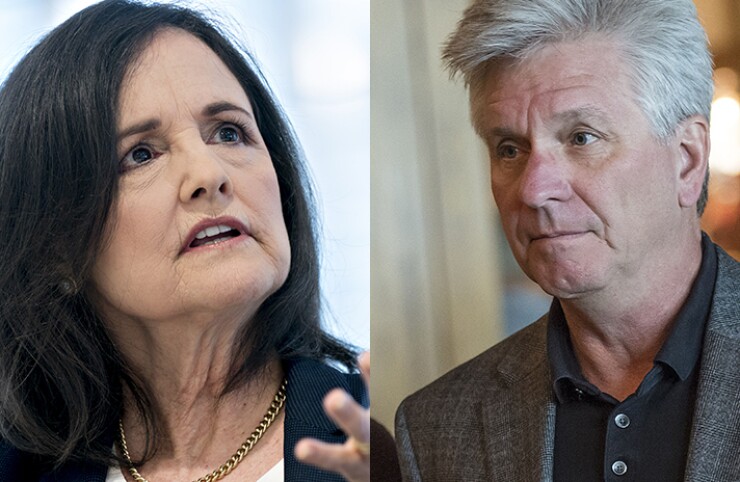The Senate Banking, Housing and Urban Affairs Committee Thursday took up the nominations of Judy Shelton and Christopher Waller to serve on the Federal Reserve Board.
Waller, executive vice president and director of research at the Federal Reserve Bank of St. Louis, advocates for low rates, but opposes negative rates and is seen as mainstream.
The panel questioned Shelton extensively about her past writings and statements, in which she took controversial stands on the gold standard, deposit insurance and debt levels, while Waller was pretty much given a free pass by the senators.

Will Shelton win confirmation? It seems like it will be a split panel along party lines, and could be in jeopardy, with some Republicans voicing concerns. It’s unlikely she changed anyone’s mind — those who oppose her weren’t won over, and those who back her will still support her — but she appeared poised, confident and unshaken in defending herself and her previous statements and writings.
While some senators suggested she went through a “confirmation conversion,” or made a 180-degree turn in her thinking, Shelton said “I feel I’ve been intellectually consistent throughout my career.” She also noted some statements attributed to her were actually just her quoting from laws written by Congress.
The Fed, she insisted, is independent by virtue of its charter, and “I don’t think Fed members are easily intimidated” by pressure from the president. “I don’t think anyone on the [Federal Open Market Committee] is affected by the pressure.”
And, criticism of the Fed is fair, and many presidents have tried to pressure the panel, she noted. But with President Trump, “at least it’s transparent.”
When asked how she would handle a downturn that would challenge zero lower bound, Shelton said she would “never go negative” and “reluctantly” use quantitative easing if rates had to be cut to zero and more stimulus was needed.
At the end Sen. Mike Crapo thanked her and said she was “very solid in explaining and defending your writings and opinions.”
Her views, if employed, would move the U.S. “toward a classic liquidity trap ... where injections of cash into the private banking system by a central bank fail to lower interest rates and hence fail to stimulate economic growth or inflation,” said Mark Pacitti, founder of Woozle Research. He expects both candidates to get the panel’s approval. “The Republicans have a one-seat advantage and I don't see any of them moving against Trump. He failed twice before with his picks, so this time ahead of the elections I see it going through. Just I don't agree with it.”
Shelton appeared to backtrack on "some of her more controversial comments about going back to the gold standard," noted Ed Moya, senior market analyst at OANDA. While "harsh questioning" from the Democrats was expected, "a few Republicans were also critical." Since just one Republican vote is needed to kill the nomination, "that seems likely right now," he said. Sen. Pat Toomey said "Shelton's answers have not eliminated his concerns" and Sen. Richard Shelby had previously voiced concern.
CPI
The consumer price index grew 0.1% in January, while the core gained 0.2%, the Labor Department reported Thursday. In December, the headline number rose 0.2% while the core was up 0.1%.
For the year, the headline number was up 2.5%, while the core rose 2.3%.
Economists polled by IFR Markets expected the monthly numbers to each rise 0.2%, while the headline year-over-year gain was seen as 2.5% and the core up 2.2%.
“Overall inflation moved up in January, but much of the increase will be temporary” since energy prices accounted for much of the year-over-year rise, Grant Thornton Chief Economist Diane Swonk said in a note.
“A sharp drop in oil prices has already occurred and will put a lid on gains in February,” she added. “The flight to safety associated with the coronavirus outbreak has also put upward pressure on the value of the dollar, which will be another check on overall inflation later this year.”
Meanwhile, Labor said initial jobless claims rose to 205,000 in the week ended Feb. 8 from 203,000 the week before. Economists were expecting a climb to 212,000. Continued claims fell to 1.698 million in the week ended Feb. 1 from 1.759 million a week earlier.





